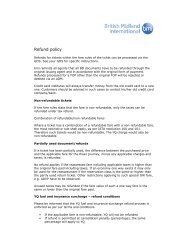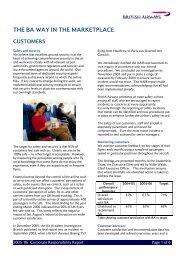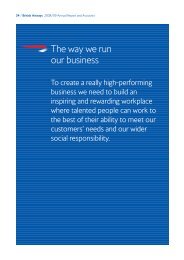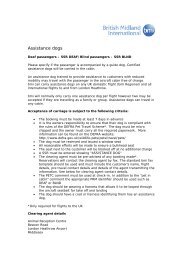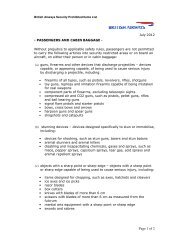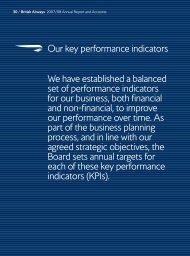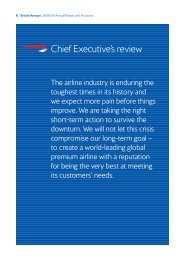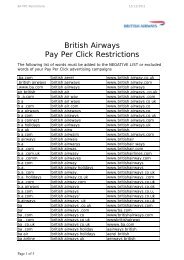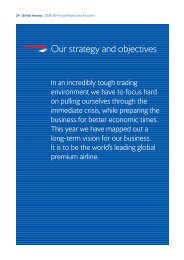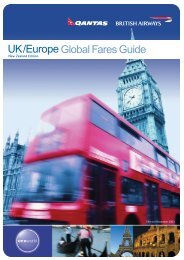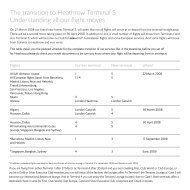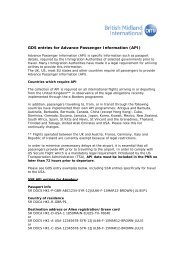Corporate governance statement (52kb pdf) - British Airways
Corporate governance statement (52kb pdf) - British Airways
Corporate governance statement (52kb pdf) - British Airways
- No tags were found...
Create successful ePaper yourself
Turn your PDF publications into a flip-book with our unique Google optimized e-Paper software.
<strong>British</strong> <strong>Airways</strong> 2008/09 Annual Report and Accounts / 57Board CommitteesThe Board has four specific Committees: Audit, Nominations,Safety Review and Remuneration. Each Committee meetsregularly under terms of reference set by the Board and copies areavailable on bashares.com. A Standing Committee, consisting ofthe Chairman or senior independent non-executive director, oneexecutive and one non-executive director, is also available whennecessary. The work carried out by each of the four specificCommittees is described in their respective reports. EveryCommittee has authority to take external advice as required.The Board receives regular feedback on investors’ views. As partof its commitment to ensuring that the Board presents a balancedand understandable assessment of the Company’s financial positionand prospects, the Board received an external view of theCompany’s investor relations activity again this year.Board performance evaluationDuring the year, each director privately met the seniorindependent director to review the performance of the Board,its Committees and the individual directors and Chairman and theresults were presented to, and considered by, the Board. In addition,the Chairman and non-executive members typically meet withoutany executives present at least twice each financial year.Relations with shareholdersThe Company maintains regular contact with its larger institutionalshareholders through its investor relations team, through meetingswith the executive directors and the Chairman and through annualinstitutional investor events. The presentations from these eventsare also available to private shareholders through the Company’sinvestor relations website, bashares.com. Seven members of theBoard attended the annual investor day in March 2009. Privateshareholders receive the Company’s shareholder magazine twicea year and are encouraged to express their views and concernseither in person at the annual general meeting or by e-mail. Themain themes are reported to the Board and responded to by theChairman in his address at the annual general meeting. All of theBoard members attended the 2008 annual general meeting. The2009 annual general meeting will be held on Tuesday July 14 at11.00 am at The Queen Elizabeth II Conference Centre, London.The ordinary business of the meeting will be the approval of theannual report and accounts; approval of the remuneration report;the re-election of directors; and the reappointment and remunerationof the auditors. The special business to be considered at the meetingwill be the directors’ authority to allot new shares, the disapplicationof pre-emptive rights in relation to an allotment of new shares, theauthority of the Company to purchase its own shares, the abilityof the Company to hold general meetings at 14 days’ notice andamendments to the Company’s Articles of Association. Full detailscan be found in the Notice of Meeting available on our websitebashareholders.com. Since 2000, all voting at the annual generalmeeting has been by way of a poll to ensure that the views of allshareholders are taken into account. All 15 resolutions put toshareholders at the 2008 annual general meeting were passed,with a minimum vote of 97.75 per cent. For the first time this year,it is planned that the Chairman’s and Chief Executive’s speecheswill be available on the website after the meeting.Directors’ conflictsWith effect from October 1, 2008, the new Companies Act 2006provisions regarding directors’ conflicts of interest came intoforce. These place directors under an obligation to avoid situationsarising on or after October 1, 2008, in which they have, or canhave, a direct or indirect interest that conflicts, or may possiblyconflict, with the interests of the Company (Section 175(1)). Thisduty is not infringed if the matter has been authorised in advanceby the directors pursuant to provisions of the articles permittingthem to do so. This duty does not apply to a conflict of interestarising in relation to a transaction or arrangement with the relevantcompany directly (such as a contract of employment).At the 2008 annual general meeting, shareholders were askedto approve a new set of articles including provisions allowing thedirectors to authorise conflicts. Pursuant to this, a register ofauthorised interests is maintained by the Company Secretaryand updated by the Board as needed from time to time.Throughout the year, the Company has complied with all relevantprovisions set out in Section 1 of the Combined Code (June 2006).Directors’ and officers’ liability insuranceThe Company has purchased insurance against directors’ andofficers’ liability as permitted by the Companies Act 1985 forthe benefit of the directors and officers of the Company andits subsidiaries.The Company has granted rolling indemnities to the directorsand the Company Secretary, uncapped in amount but subjectto applicable law, in relation to certain losses and liabilities whichthey may incur in the course of acting as officers of companieswithin the Group. These indemnities also set out the terms onwhich the Company may, in its discretion, advance defence costs.A specimen indemnity is available for view on the Company’sinvestor relations website, bashares.com by clicking on theheading <strong>Corporate</strong> Governance.Political donationsAt the annual general meeting in 2008, shareholders passed aresolution to authorise the making of political donations and theincurring of political expenditure for the purposes of section 367of the Companies Act 2006. This authorisation was taken on afour-year basis as a precaution only and we have no presentintention of using it. In the event that any political donation ismade or political expenditure incurred, we would seek furthershareholder approval.We do not make political donations or incur political expenditurewithin the ordinary meaning of those words and have no intentionof doing so. The amount of political donations made and politicalexpenditure incurred in the year to March 31, 2009, was £nil(2008: £nil).Post-balance sheet eventsThere were no material post-balance sheet events occurring afterMarch 31, 2009.Overview Our business <strong>Corporate</strong> <strong>governance</strong> Financial <strong>statement</strong>s
58 / <strong>British</strong> <strong>Airways</strong> 2008/09 Annual Report and Accounts<strong>Corporate</strong> <strong>governance</strong> <strong>statement</strong>continuedInternal control and risk managementInternal controlThe directors are responsible for, and for reviewing theeffectiveness of, the Company’s system of internal control,including internal financial control, which is designed to providereasonable, but not absolute, assurance regarding (a) thesafeguarding of assets against unauthorised use or dispositionand (b) the maintenance of proper accounting records and thereliability of financial information used within the business or forpublication. These controls are designed to manage rather thaneliminate the risk of failure to achieve business objectives due tocircumstances which may reasonably be foreseen and can onlyprovide reasonable and not absolute assurance against materialmis<strong>statement</strong> or loss.Standing instructionsThe Company has a Statement of Business Principles applicable toall employees. The Company also has a Code of Business Conductand Ethics which applies to all employees. These are two of anumber of Standing Instructions to employees of the Groupdesigned to enhance internal control. Along with the FinanceStanding Instructions, these are regularly updated and madeavailable to staff through the Company’s intranet.Organisation structureA clear organisational structure exists, detailing lines of authorityand control responsibilities. The professionalism and competenceof staff is maintained both through rigorous recruitment policiesand a performance appraisal system which establishes targets,reinforces accountability and awareness of controls, and identifiesappropriate training requirements. Action plans are prepared andimplemented to ensure that staff develop and maintain therequired skills to fulfil their responsibilities, and that the Companycan meet its future management requirements.Information systemsInformation systems are developed to support the Company’slong-term objectives and are managed by a professionally staffedInformation Management team within the Chief Financial Officer’sorganisation. Appropriate policies and procedures are in placecovering all significant areas of the business.Strategic planThe business agenda is determined by the strategy (pages 24to 28) setting out the agreed targets for financial return andservice standards, and identifying and prioritising improvementopportunities to deliver those targets. The strategic planningprocess confirms that the targeted results can be achieved,satisfies departments that their plans are robust and establishesperformance indicators against which departments can beevaluated. The Board on an annual basis approves the strategy,which is supported by a detailed financial plan for the year ahead.Progress against the plan is monitored each month.Management accounting systemA comprehensive management accounting system is in placeproviding management with financial and operational performancemeasurement indicators. Detailed management accounts areprepared monthly to cover each major area of the business.Variances from plan and previous forecast are analysed, explainedand acted on in a timely manner. As well as regular Boarddiscussions, monthly meetings are held by the Management Boardto discuss performance with specific projects being discussed asand when required. Throughout 2008/09, the Capital InvestmentCommittee, chaired by the Chief Financial Officer, wasinstrumental in maintaining tight control of capital and majorcontract expenditure and headcount. All major corporate projectsare audited regularly.Internal control frameworkEffective corporate <strong>governance</strong> remains key to the business.The Company continues to review its internal control frameworkto ensure it maintains a strong and effective internal controlenvironment. The effectiveness of the framework has been underregular review by the Management Board. The Group will continueto comply with the Combined Code on corporate <strong>governance</strong> andthe UK Listing Authority rules.Business controls are reviewed on an ongoing basis by the internalcontrol function which operates internationally and to a programmebased on risk assessment. Professionally qualified personnelmanage the department with experience gained from both insideand outside the industry. A risk-based audit plan, which providesassurance over key business processes and commercial andfinancial risks facing the Company, is approved by the AuditCommittee quarterly.The Audit Committee considers significant control matters raisedby management and both the internal and external auditors andreports its findings to the Board. Where weaknesses are identified,the Audit Committee ensures that management takes appropriateaction. No significant failings or weaknesses were identified during2008/09.Risk managementThe Company has a structure and process to help identify, assessand manage risks. This process has been in place throughoutthe year to which these <strong>statement</strong>s apply and up to the dateof their approval.The Risk Group consists of the Management Board and theHead of <strong>Corporate</strong> Risk and Internal Control. Meeting quarterly,it reviews the Company’s key risks contained in the corporaterisk register and ensures that all new and emerging risks areappropriately evaluated and any further actions identified.The Risk Group also provides policy and guidance to thoseresponsible for managing the individual risks and to thedepartmental risk leaders.
<strong>British</strong> <strong>Airways</strong> 2008/09 Annual Report and Accounts / 59The management of each major area of corporate risk is subjectto review by an appropriate ‘assurance body’. This includes areview of the controls in place to mitigate the risks and the furtheractions being taken by management. The Risk Group reportsquarterly to the Audit Committee to assist the Board in themanagement of risk in accordance with the October 2005Revised Guidance for Directors on the Combined Code.The risk management process includes multiple opportunities forrigorous discussion and debate to assess the relative profile ofeach risk to the other. The outcome includes a heat map whichplots each critical risk on an impact and likelihood scale. For eachcritical risk, mitigating actions exist and are actively managed. Thisprocess is iterative and refreshed on an ongoing basis. This reportdoes not include the mapped results and mitigating actions for theprincipal risks because of the sensitive commercial nature of someof management’s plans.Liquidity risk is discussed in more detail within the Chief FinancialOfficer’s report on page 17. The Treasury Committee, chaired bythe Group Treasurer is responsible for managing liquidity risk andoperates within clearly defined parameters.AuditorResolutions to reappoint the retiring auditor, Ernst & Young LLP,and to authorise the directors to determine its remuneration willbe proposed at the 2009 annual general meeting.Receipts and returns to shareholdersDividendThe Board has decided not to recommend the payment of a finaldividend (2008: 5 pence per share).Share issues, buy-backs and treasury sharesThe authorised share capital of the Company is unchangedfrom the previous year. However, there has been an increasein the issued share capital. Details of the current authorisedand issued share capital are set out in the sections headed‘Shares and shareholders’ and ‘Capital structure and shareholderrights’, respectively.Under UK legislation, the Board can be given authority to allotshares in the Company by the passing of an ordinary resolutionat a general meeting of the Company. The Board currently hasauthority to allot shares in the Company up to an aggregatenominal value of £95 million by virtue of a resolution passedat the annual general meeting of the Company held on July 15,2008. This authority expires on July 14, 2009, and shareholderswill be asked to renew this authority at the 2009 annualgeneral meeting.Without prejudice to any special rights previously conferred on theholders of any shares or class of shares for the time being issued, anyshare in the Company may be issued with such preferred, deferredor other special rights, or subject to such restrictions, whether asregards dividend, return of capital, voting or otherwise, as theCompany may from time to time by ordinary resolution determine(or, in the absence of any such determination, as the Board maydetermine) and, subject to the provisions of the Statutes, theCompany may issue any shares which are, or at the option of theCompany and/or the holder are, liable to be redeemed.The Articles of Association of the Company can be altered by thepassing of a special resolution by the shareholders at a generalmeeting of the Company.Rules about the appointment and replacement of directors areset out in the Company’s Articles of Association. The directors’powers are conferred on them by UK legislation and by theCompany’s Articles of Association.The Company is authorised to conduct share buy-backs up toapproximately 10 per cent of the issued ordinary share capital.This is subject to certain limitations relating to the maximum andminimum prices that may be paid for any shares bought back.This authority is only exercised if the Board considers the buybackto be in the interests of shareholders. The Company hasnot conducted any share buy-backs since the authority was firstobtained. Shareholders will be asked to renew this authority at the2009 annual general meeting.Shares, which have been bought back, are held in treasury. Theycan be sold quickly (subject to insider dealing rules) and costeffectively, giving the Company additional flexibility in themanagement of its capital base. Whilst in treasury, the shares aretreated as if cancelled so that no dividends are paid on them andthey have no voting rights. No shares were held in treasury duringthe year ended March 31, 2009 (2008: nil).Shares and shareholdersThe number of ordinary shares issued and fully paid as at March31, 2009, was 1,153,628,000 (March 31, 2008: 1,153,105,000).The increase over March 31, 2008, reflects the issue of newordinary shares to satisfy the share options exercised during theyear under the <strong>British</strong> <strong>Airways</strong> Share Option Plan 1999 and thevesting of shares awarded under the Performance Share Plan asset out in notes 33 and 34 to the financial <strong>statement</strong>s.Capital structure and shareholder rightsThe authorised share capital of the Company is £378 milliondivided into 1,512 million ordinary shares of 25 pence each andone special voting share of 25 pence. All ordinary shares haveequal rights to dividends and capital and to vote at generalmeetings of the Company. The rights attached to the ordinaryshares, in addition to those conferred on their holders by law,are set out in the Company’s Articles of Association.Overview Our business <strong>Corporate</strong> <strong>governance</strong> Financial <strong>statement</strong>s
<strong>British</strong> <strong>Airways</strong> 2008/09 Annual Report and Accounts / 61In order to protect the air service operating rights of theCompany, the number of ordinary shares held by non-UKnationals is monitored, as is the number of ordinary shares held bypersons who are not nationals of states comprising the EuropeanEconomic Area (EEA). At March 31, 2009, 34 per cent of theordinary shares of the Company were held by non-UK nationals(March 31, 2008: 31 per cent) and 20 per cent of the ordinaryshares were held by persons who were not nationals of statescomprising the EEA (March 31, 2008: 19 per cent). Althoughthere are no large interests of single or associated non-UKnationals, the directors cannot rule out the possibility that thedirectors may be required to exercise their powers to restrictnon-UK or non-EEA share ownership in order to protect theCompany’s operating rights.Waiver of dividendsThe <strong>British</strong> <strong>Airways</strong> Employee Benefits Trust (Jersey) Limited,which holds <strong>British</strong> <strong>Airways</strong> shares for the purpose of satisfyingawards and options granted to employees under the Company’semployee share schemes, has waived its rights to dividends. TheTrustee does not vote the shares that it holds. At March 31, 2009,there were 2,165,281 shares held in the Trust (March 31, 2008:2,087,147).Shareholder analysisAs at March 31, 2009, there were 214,119 shareholders (March31, 2008: 214,254). An analysis is given below.Percentage PercentageSize of shareholding of shareholders of shares1 – 1,000 87.70 4.641,001 – 5,000 10.82 3.815,001 – 10,000 0.87 1.0810,001 – 50,000 0.36 1.2450,001 – 100,000 0.05 0.65100,001 – 250,000 0.07 2.01250,001 – 500,000 0.04 2.52500,001 – 750,000 0.02 2.01750,001 – 1,000,000 0.01 1.71Over 1,000,000 0.06 80.33Total 100.00 100.00Percentage PercentageClassification of shareholding of shareholders of sharesIndividuals 97.84 10.12Bank or Nominee 1.87 88.45Insurance companies 0.01 0.01Pension trusts 0.01 0.02Investment trusts 0.02 0.01Other corporate bodies 0.25 1.39Total 100.00 100.00Significant holdingsThe Company has been notified pursuant to the DTRs of thefollowing interests in 3 per cent or more of the Company’s issuedordinary shares as at March 31, 2009:Percentage Direct IndirectName of shareholder of holding % %Iberia 9.07 9.07 NilStandard Life plc 8.01 5.15 2.86Barclays PLC 6.90 6.90 NilAMVESCAP Plc 6.74 Nil 6.74Lloyds Banking Group plc 5.37 0.80 4.57AXA S.A. 4.85 0.75 4.10INVESCO plc 4.30 Nil 4.30Legal & General Group Plc 3.99 3.99 NilImpact of change of controlThe following significant agreements contain provisions entitlingthe counterparties to exercise termination or other rights in theevent of a change of control of the Company:• All of the Company’s share schemes contain provisions relatingto a change in control. Other than the Performance Share Plan,which is subject to the satisfaction of any performanceconditions at that time, all outstanding options would normallyvest and become exercisable on a change of control;• Joint business agreement with Iberia, which coordinatesschedules, marketing, sales, freight, pricing and customerservice activities;• Codeshare agreements with American Airlines, Cathay Pacific,Iberia, bmi, Qantas and Aer Lingus; and• Contracts to sell miles to Alaska Airlines, American Airlines,Lloyds TSB and Tesco.Neither of the executive directors’ service contracts providesfor compensation to be paid in the event of change of controlof the Company.Overview Our business <strong>Corporate</strong> <strong>governance</strong> Financial <strong>statement</strong>s



